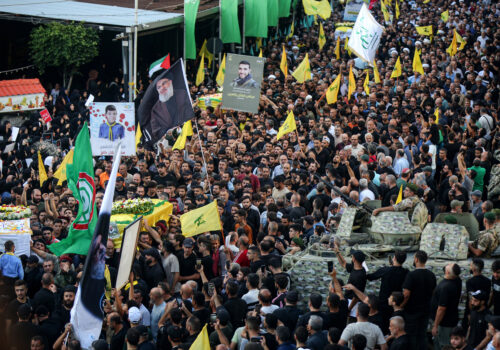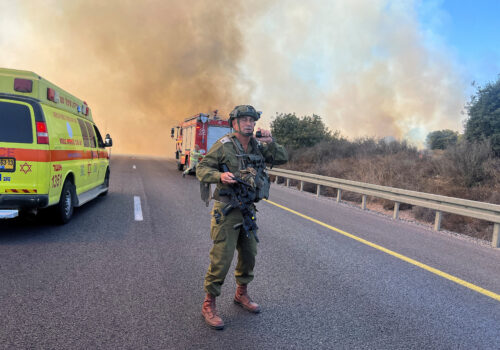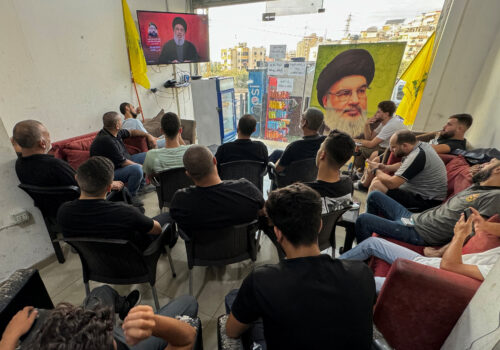The Third Lebanon War between Israel and Hezbollah has begun. What’s next?
Since the heinous terrorist attack on October 7, 2023, Israel has waged a war against Hamas to ensure that this type of attack cannot happen again. To do so, Israeli Prime Minister Benjamin Netanyahu set a goal of demilitarizing Hamas in Gaza and ensuring that it can no longer govern. Simultaneously, Iran’s largest terrorist proxy force, Hezbollah, has fired more than 8,000 rockets, missiles, and mortars into Israel, killing civilians and soldiers alike, and displacing nearly 100,000 Israeli citizens in the north. For months, world powers have been engaging in back-door diplomacy trying to head off a war to no avail. Hezbollah has refused to move its forces from near the Israeli border to the Litani River, approximately nineteen miles north, as required by United Nations (UN) Security Council Resolution 1701, which stipulates that any forces other than UN peacekeepers or Lebanese military must vacate.
Hamas has been severely degraded in Gaza, and Hezbollah has refused to move, so last week Israel began a new approach. This approach is in line with the one it has taken in Gaza that resulted in the first hostage deal in late November 2023. Israel has decided to exert military pressure on Hezbollah to try and force a settlement and repatriation of displaced persons in northern Israel. Here are the steps Israel has taken in the past week:
First, Israel modified the goals of the ongoing war to include returning citizens to their homes in Israel. This was a government action to make the impending military and intelligence operations conducted by the Israel Defense Forces (IDF) and Mossad in Lebanon a part of the war and to allocate resources accordingly.
Second, Israel initiated a sabotage campaign against Hezbollah leaders and senior fighters. Israel had placed explosive charges inside beepers and radios that Hezbollah had ordered for primary and back-up command and control during war. Each device was filled with just enough explosives to severely injure or kill the user, and thousands of the devices went off on September 17 and 18.
Third, Israel launched a targeted strike in Beirut on September 20 that took out almost all of Hezbollah’s Radwan Unit leadership during a secret meeting. Radwan Units are Hezbollah’s special operations forces.
Fourth, Israel saw preparations for a massive attack against Israel and took preemptive strikes on September 21 against missile and rocket launchers and storage sites in Lebanon. Israel’s Iron Dome shot down those rockets and missiles that did manage to launch.
Fifth, Israel initiated a massive aerial bombardment campaign targeting remaining stockpiles, depots, and launchers in southern Lebanon on Monday. We can expect to see days if not a week or more of additional bombing campaigns targeting what Israel says are thousands of Hezbollah targets in Lebanon. Israel’s aim is to systemically degrade Hezbollah’s rocket and missile inventory, which was estimated to be between 120,000 to 150,000 at the beginning of the war. This is being done to try and prevent Hezbollah from overwhelming Israel’s Iron Dome with significantly larger barrages of rockets and missiles. So far Israel has been successful in doing so.
The length of the third war will depend largely on how quickly Hezbollah will come to the table.
Israel’s sabotage campaign, preemptive strikes, and airstrikes against rocket launchers and storage depots appear to have taken Hezbollah by surprise. The group has yet to respond in a meaningful way. Hezbollah’s operations are likely in disarray as many senior leaders have been killed or wounded in the past week. In creating that disarray, Israel has demonstrated its ability to penetrate and collect operational intelligence on Hezbollah.
What comes next will depend on Hezbollah. So far, Israel has largely left Beirut alone, but bombardments of Hezbollah targets there and elsewhere in the country could follow if Hezbollah refuses to budge on the issue of moving north of the Litani River. If that does not work, Israel will likely be forced to launch a ground invasion into southern Lebanon to push Hezbollah out. That hasn’t happened in nearly twenty years. While this would be a significant military expansion for Netanyahu’s government, there does appear to be broad political support. National Unity Party chairman Benny Gantz, who resigned from Israel’s wartime cabinet in June, stated Monday that he would support a ground invasion of Lebanon if that is what is required.
A ground invasion into southern Lebanon would be required if the IDF is unable to take out Hezbollah’s positions, weapons stockpiles, and launch sites in the area between the border and the Litani River. This would involve armored units, artillery, infantry, and special forces sweeping through the area, conducting raids, and targeting Hezbollah positions. Israel would prefer to avoid doing so given the risk to ground forces. But if it feels a ground invasion is a necessary step, it may seek to soften the battlefield as much as possible using aerial bombardment, as it has done in Gaza, prior to deploying ground forces. Again, that will depend on whether Hezbollah voluntarily withdraws north of the river and on whether Israel determines it can accomplish its mission from the air alone.
The Second Lebanon War lasted for thirty-four days in 2006. The length of the third war will depend largely on how quickly Hezbollah will come to the table. Another important question: What will Iran do? Tehran may, for example, push for a quick end to preserve Hezbollah, as it may not want to lose its largest proxy force in the region. Hezbollah would play a key retaliatory role if Israel were to strike Iran’s nuclear sites, a problem that is still simmering in the background of an increasingly volatile regional conflict.
Alex Plitsas is a nonresident senior fellow with the Middle East Programs’ Scowcroft Middle East Security Initiative and leads the Initiative’s Counter-Terrorism Project. He previously served as chief of sensitive activities for special operations and combating terrorism in the Office of the Secretary of Defense.
Further reading
Wed, Sep 18, 2024
Experts react: What’s behind the Hezbollah beeper and walkie-talkie explosions
Experts react By Atlantic Council experts
Our experts explain what the explosions of communication devices in Lebanon could mean for the conflict between Israel and Hezbollah.
Tue, Sep 17, 2024
This is not the time for the United States to go soft on Hezbollah
New Atlanticist By Jonathan Rosenstein and Eliana Aiken
If Israel decides on a major campaign in Lebanon to remove the threat from Hezbollah, the US should have its ally’s back.
Sun, Aug 25, 2024
After a failed attack, Hezbollah’s propaganda seeks to prevent a wider war with Israel
MENASource By David Daoud
Committed as Hezbollah is to saving its Gaza-based allies, the group does not currently want a full war with Israel.
Image: People watch as smoke billows over southern Lebanon following Israeli strikes, amid ongoing cross-border hostilities between Hezbollah and Israeli forces, as seen from Tyre, southern Lebanon September 23, 2024 REUTERS/Aziz Taher



